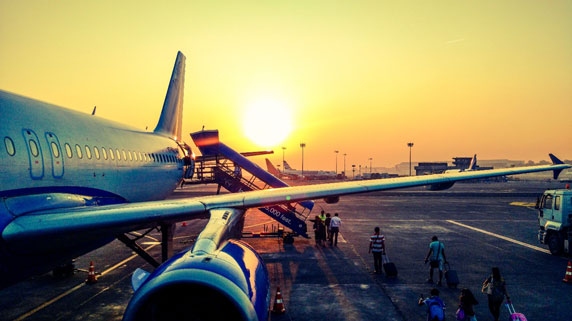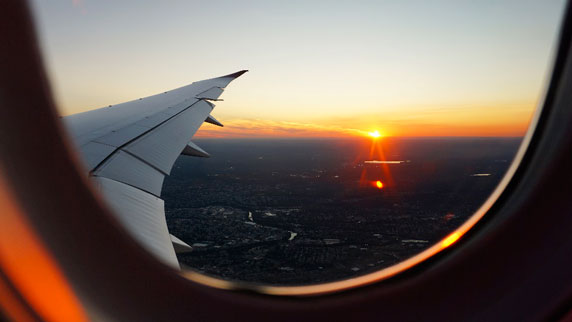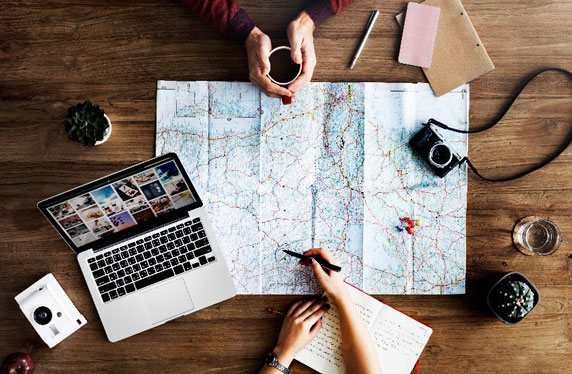
Jet lag is no joke. These six little letters can spell the difference between a life-changing family adventure and a total nightmare.
With jet lag comes symptoms that can eat into valuable vacation time including:
- Drowsiness
- Fatigue
- Disorientation
- Insomnia
- Irritability
- Stomach upset
What's worse, these symptoms are likely to appear again when you return home!
Jet lag spares no one. Seasoned jet setters like travel bloggers Nomadic Matt and Janice Waugh have documented their battles with jet lag.
Mark Wolters and his family travel every chance they get. His son Caleb had visited 25 countries by the time he was eight years old. Mark says, "When you travel, you get time changes. When you get time changes, chances are you are going to get jet lag." His video provides helpful tips from his own experience.
Thankfully, the fear of jet lag doesn't have to be the reason to limit your family vacations to your own time zone. With some careful and purposeful preparation, your entire family can see the world with eyes wide open, a positive outlook, and plenty of energy in the tank.
3 Key Considerations to Help Your Family Deal with Jet Lag
The most important factors in predicting how jet lag will affect you and your family are the length of your trip, the direction you travel, and the travelers' ages. Ignoring any one of these factors could quickly turn your family vacation into a groggy, grumpy disaster.
Short Trips Versus Long Trips

While jet lag doesn't care how many days and nights you have booked for your family vacation, your body does. We all have internal clocks that govern our circadian rhythms. These inborn timings play a key role in governing both our mental and physical well-being.
Unlike regular clocks, our internal ones cannot be reset quickly. Studies have shown that it can take days to catch up with changes to our local time.
A good rule of thumb is that it takes you about as many days to completely adjust to a new time zone as it does the number of time zones you travelled through (or more if you don't take steps to adequately prepare (more on that later).For this reason, it may do more harm than good to make major sleep adjustments to combat jet lag for trips lasting less than three days. Business traveler and fatigue expert Christopher M. Barnes agrees:
For some short trips, you may decide that it is not worth it to get your circadian process in alignment with the local time; especially because you have to go through the difficulties of switching back when you return.
Instead, make it a point to plan intentional down time into the itinerary. This way your family members should at least have enough opportunities to grab some sleep throughout the day and night.
There are other strategies for dealing with jet lag on short trips, but your mileage may vary (especially with kids in tow!). Ultimately, if you are planning a short family trip across time zones, you must be OK with the fact that it is unlikely that anything resembling a normal sleep pattern will set in.
For longer trips, however, it is vital to take jet lag and its effects seriously. Planning must begin before the trip and carry all the way through to the days after your return. Failing to account for your family's sleep needs can derail your traveling adventure in irreparable ways. It can also make transitioning back to daily life even worse!
East-to-West versus West-to-East

Time zones are dictated by longitude. When traveling from east-to-west, travelers gain an hour for every time zone they pass through. Conversely, traveling west-to-east results in a loss of an hour per zone.
Generally, traveling westward requires less jet lag recovery than traveling eastward. This is because your body is better equipped to handle gaining a few hours than losing them.
Unfortunately, most family vacations don't only involve traveling one way. This means that at some point, you will need to account for both gaining and losing hours.
For example, vacationing to the west will make jet lag easier to cope with while you are on your trip, but readjusting back at home will be more difficult.
On the other hand, traveling east means you will need to give extra careful attention to your anti-jet lag plan, or else risk a rough adjustment period while you should be seeing the world with your family. Mercifully, gaining time on the return trip should make getting back into the daily routine easier.
To prepare, your family should start to account for the time changes before your bags are even packed. The direction of travel determines how your bedtimes should adjust. According to the National Sleep Foundation, anticipate the time change for trips by getting up and going to bed earlier several days prior to an eastward trip and later for a westward trip.
Self-proclaimed nomad Lash of the LashWorldTour blog has even gone so far as to apply a formula to her anti-jet lag preparations (which, as she reported, worked!)
Age matters

While there are definitely some common issues to account for when facing off with jet lag, a one-size-fits-all approach will not save your family vacation.
People have varying sleep needs depending upon their age. As such, jet lag will affect each of the members of your family in different ways.
Be sure to account for your travelers' ages when devising your plans to cope with time differences. It will be the ticket to ensure that everyone in your entourage gets the sleep he or she needs for an enjoyable travel experience!
Turning to the experts, here are what some of the best ways to help each member of your family deal with jet lag.
Babies

There is a lot of trial and error involved in deducing babies' needs. That said, as a parent of 9-month-old twins, let me tell you: schedules matter - especially when it comes to sleep and food. Having just survived our second Daylight Savings Time switch, I can attest that even the slightest shift can throw a baby off for days.
As with all things baby, don't be discouraged. If you're up for it, there are definitely ways you can bring your baby along for the family vacation. Planning and scheduling matters, but you must also be prepared and willing to adjust. Patience and flexibility are key with your youngest travelers.
Sleep needs:
Babies need varying amounts of sleep depending upon their developmental age. The pediatricians at Stanford Children's Health recommend:
| Age | Total Sleep Hours | Total Hours of Nighttime Sleep | Total Hours of Daytime Sleep |
|---|---|---|---|
| Newborn | 16 Hours | 8 to 9 | 8 |
| 1 month | 15.5 hours | 8 to 9 | 7 |
| 3 months | 15 hours | 9 to 10 | 4 to 5 |
| 6 months | 14 hours | 10 | 4 |
| 9 months | 14 hours | 11 | 3 |
| 1 year | 14 hours | 11 | 3 |
Preparing for the trip:
Babies are creatures of habit in many ways. It is advisable to tune them up for their jet-lagged adventure in the week before departure. Family travel writer Laura Sutherland agrees, “A few days before you leave home, try to shift your child's bedtime 20 minutes each night to get ready for the new time. By takeoff, baby's schedule will be that much closer to the destination time zone.
Also, be sure to pack key items to help create a comfortable, controlled sleeping environment. Along with must-pack items like passports and bottles, some items to be sure to remember include:
- Black out shades
- A favorite comfort item (or few!)
- Sheets that smell like home
- Any night lights, music, or noise machines from the baby's nursery
- Books or other items that are part of the bedtime routine
With baggage limits what they are, it can be easy to dismiss some or most of these types of items. Just remember, if baby isn't sleeping, odds are no one will be.
Upon arrival:
Two of your first priorities when traveling with a baby should be to establish a comfortable, makeshift nursery environment and to get into routines on local time.
Debbie Dubrow of Delicious Baby asserts, "Young babies rely on routines to help them understand their day. Try to keep your naptime and bedtime rituals similar to the routines you use at home, this will help your baby adjust." She's absolutely right!
In our house, bedtime has always involved progression of a feeding, play, bath time ablutions, a story, lights out, another feeding, and bed. With twin babies, this progression is set in stone and non-negotiable. It happens regardless of any time shifts, family visits, or illnesses. As such, our babies have a clear indication when it is time to wind down and prepare for a full night's sleep. What's more, it works!
This regularity works for jet lag, too. Carrie Bradley from Flying with a Baby reminds parents, "Babies often have to re-adjust their sleep through growth spurts, teething, not feeling very well etc, and jet lag will be temporary like these times."
Odds are you've been through a strange sleeping pattern with your baby before. When all else fails, call back to what was most successful in enduring your last irregular schedule. Routines for the win!
Returning home:
Once baby is home, the adjustments start anew. Immediately start feeding on the home-time schedule (in accordance with your pediatrician's advice) and try to wrangle naps and bedtimes back into sync.
Sleep schedule adjustments will likely play out incrementally just as they did in preparation for the trip. Extra walks outside and high-energy activity during the daytime hours can help speed up the process.
What to avoid:
Know that there are no shortcuts or cure-alls to magically get your baby into a rhythm. Laura Sutherland cautions, "Don't give your child an antihistamine to make him drowsy. The medication may interfere with his adjustment to a new time zone. It can also rev up your baby rather than slow him down."
When faced with baby jet lag, the best you can do is just help the process along with consistency and a basic plan. Know and accept that it's going to take time, but it doesn't have to totally upend your family vacation.
Toddlers

Sleep needs:
WebMD recommends that toddlers should get 10-14 hours of sleep per day which includes a nap of around 1-3.5 hours.
Preparing for the trip:
Preparing a toddler for a cross time zone trip is very similar to preparing a baby, just with some minor adjustments.
- Start moving naps and bedtimes back or ahead (depending on your travel direction) starting several days before your vacation.
- Pack any key items that are part of the bedtime routine. This means sheets, favorite books, toys for snuggling, and anything you might normally use to regulate light and sound.
- Consider keeping some of these bedtime items as a part of your carry-on luggage if your flight takes place during the normal sleeping time in your destination time zone. Even if your toddler doesn't sleep, you can start planting the seeds that a particular time is going to be the new sleep time in the near future.
Upon arrival:
Take your best shot at jumping right into the local time zone with your typical feeding schedules. Sleep adjustments, however, won't happen automatically (or even right away); but within a few days, the effort will pay off.
Christine Knight, an Australian expat living in New York, shares her experiences traveling with toddlers:
The first 48 hours will be the worst for jetlag. From the second day on, slowly push the nap and bedtime back or forward an hour, depending on the time zone you arrived in. Get out and as much sunlight as possible as it helps reset the body clock. Lots of exercise tires a child out and helps them sleep sounder as well.
Of course, if you start slowly adjusting naps and bedtimes prior to the trip, the transition will likely take root sooner.
Try your best to use light to your advantage. When the sun is up, your toddler should be too. The obvious exception is scheduled naptime (which the whole family may need early on). These naps will be key in establishing some normalcy while also providing the necessary recharge to continue the fight against jet lag.
For both naptime and bedtime, do your best to create a calm, dark environment to maximize the chances that your little one is able to get some much-needed sleep.
Returning home:
Toddlers are notorious for their rapid swings from high energy to completely wiped out. Be prepared for this dynamic to be amplified by jet lag as you try to reset back to normal routines.
Provide lots of extra opportunities for active play, preferably outdoors. However, once bedtime hits, avoid the temptation to resort to high-energy options - no matter how wide awake your toddler may be. Instead, go with calming activities in bed like reading stories, playing with soft toys, and extra snuggles.
Pair this commitment to bedtime being "in-bed" time with plenty of purposeful activity during the day to help make the transition home go more smoothly.
What to avoid:
Just as with babies, avoid the temptations to take shortcuts. Medicating a toddler to induce sleep or opting for a quick sugar rush to help wake one up is never a good idea. While it may get energy levels where you want them in the moment, you will pay for it in poorer sleep, potential meltdowns, and longer adjustment periods.
During the transition, make sure the same adult or older child isn't always the one jumping up to tend to a suddenly wide awake toddler. Unlike babies that tend to stay where they are put, toddlers can be up and running in a flash. This can make for some surprising, late-night wake ups. Rotate the responsibility to be on "toddler duty" so that everyone has a chance to get rest and reset his or her own out-of-whack internal clocks.
Grade-schoolers

Family travel blogger Eric Stoen recounts:
At around six or seven [years old] something magical happened; our kids no longer got jet lag. My wife and I may be up for a couple hours in the middle of the night, but the kids are, almost without exception, now sleeping through the night and are immediately on European time. I have no idea how they do it.
Not all parents may be so lucky. That said, there is something to the fact that kids tend to be more resilient than both their younger and older counterparts are when it comes to time changes.
Sleep needs:
Dr. Eric J. Olson M.D. of the Mayo Clinic recommends 10-13 hours of sleep for children ages 3-5 and 9-11 hours for children ages 6-13.
Preparing for the trip:
If the trip is during the school year, secure some of the classwork your child will be missing while on the trip. This can be a helpful go to when it is time to bring the energy levels down before bed.
On the flip side, it can be hard for anyone suffering from jet lag to want to get up and moving, especially early in a vacation.
Get your kids involved in the planning process by letting them learn about your destination ahead of time. Spend time with them checking out books, travel guides, and websites and come up with activities and sights that pique their interests. When the alarm goes off and kids are dragging, having a carrot on the itinerary to dangle never hurts!
Upon arrival:
Routine is as big a part of helping school-aged kids through bouts of jet lag as anyone else. Thankfully, there are more options for getting them engaged than there are for younger kids.
The biggest advantage you have when dealing with 4-12 year olds as opposed to younger and older ones is communication. Younger children struggle to verbalize their needs and clearly express themselves. Older kids usually just don't want to (or at least not to you).
Be mindful of the signals your child is giving both verbally and nonverbally about their energy levels. Be both purposeful and communicative about when it is time to get moving and time to prepare for sleep.
Asking leading questions like, "We have to be in bed in two hours, is there something you would like to do to help wind down?" For 8-year-old me, a dip in a hotel pool before bed always did the trick. Your results may differ, so have some options (both high-energy and low key) at the ready. You can steer kids toward a desired behavior while also giving some agency and choice in the process (it's their vacation too, right?).
Returning home:
Get back into the swing of things right away, but tread lightly. It will take time for schedules and energy levels to settle back down into the local time zone. That said, it is important to immediately commit to things like meal times and in-bed times reverting to normal.
Especially in the first few days, this may mean an extra healthy snack (or two) may be in order to stave off hunger between meals or before bed. Bedtime may need to involve some additional low-key activities like extra reading time, calm games, or relaxing puzzles to help retune energy levels.
Also, an extra day off from school may not be the worst idea. The payoff will be worth it long as there is plenty of time dedicated to both getting outdoors (the sun works wonders for jet lag) and fully committing to the regular, pre-trip schedule.
As a teacher, I can tell you with a clear conscience that a student rolling into class jet lagged after a long flight isn't going to be learning a whole lot. When paired with a return trip on a Thursday or Friday, an extra day off from school could create a nice three-day window for your kiddo to find his or her groove.
What to avoid:
Don't insist on making all of the decisions for your grade-schooler in regards to the vacation and jet lag adjustment routines. By bringing him or her into the loop, you can help ensure there are activities they want to get up and out of bed to partake in. Similarly, you can be better prepared for the types of calming activities they would prefer to have available for bedtime.
Teenagers

As expat blogger Carole Hallett Mobbs jokes, "Staying in bed all day and awake all night? Grumpy and uncommunicative? How would you notice if this is jet lag or just normal teen behavior?"
Luckily, most teenagers don't just have a healthy love of sleep, their bodies crave it. Taking steps to help your teen prepare for and cope with jet lag may not spare you from the pangs of puberty, but it could improve your family travel experience dramatically.
Sleep needs:
Studies show that teenagers need an average of 9 hours of sleep per night.
Preparing for the trip:
A regular sleep routine in the weeks and months prior to a family vacation will make it easier for teens to cope with jet lag during and after it. Before traveling, try to tame common, unhealthy teenage habits like staying up late, sleeping in, and long naps.
Just as with younger children, the more established sleep patterns are at home, the easier they will be to re-establish once jet lag has set in. Moreover, the more in tune a family's bedtimes are prior to a trip, the easier it will be to both cope with jet lag and enjoy the vacation together.
Upon arrival:
Few things are easy with a teenager. Helping them fend off jet lag is no exception. It may be challenging, but being the heavy early will make for a better overall family vacation for everyone - your teen included.
- From day one of your vacation, get your teen up, moving, and outside. Giving into a teen's desire to nap and sleep in will establish a baseline of lethargy that will be especially hard to break in the subsequent days.
- Like with grade-schoolers, purposefully involve your teenager in the itinerary planning process. Ensuring there are things he or she wants to do may make waking up less of a battle.
- Establish a bedtime that also includes shut-off times for electronics. They may not like it, but bust as light can be a helpful force in getting adjusted to a new time zone, the artificial light from a phone or tablet can be counterproductive.
Returning home:
Once back at home, jump right back into the sleep schedule that (hopefully) was established before the trip. Extra exercise and outdoor activity can help speed up recovery.
What to avoid:
According to the UCLA Sleep Center, teenagers should generally avoid
- Naps longer than an hour
- Caffeine of any kind after 4pm local time
- Engaging with screens or exciting activity prior to bedtime
These guidelines are even more important when trying to adjust to a new local time or readjusting after a jet lagged return home!
Adults

Don't forget about yourself! In all the preparation and planning to help your family deal with jet lag, it can be easy to forget that you too will be feeling the effects of a confused internal clock.
Sleep needs:
The National Sleep Foundation recommends 7-9 hours of sleep for most adults, however anywhere from 6-10 hours "may be appropriate."
Preparing for the trip:
The most important work adults can do prior to a time zone-crossing family vacation is in preparing the younger travelers. All the adult sleep-training and jet-setter best practices go out the window when children aren't getting the sleep they need. Remember: when they're up, you're up.
So, as you make preparatory adjustments to your kids' schedules and bedtimes, try to follow them yourself. If their sleep patterns are going to be what govern the success or failure of your trip, you should get used to sneaking in your shut-eye when they do.
Upon arrival:
Throw all your favorite business travel tips out the window. When it comes to jet lagged travel with kids, the best approach is equal parts patience, teamwork, and flexibility.
Be ready. You have planned for helping your kids through jet lag, but there are going to be some rough spots.
The best strategy is to work together. The adults on the trip should take a tag team approach to helping the younger ones with their adjustments. Travel blogger Christine Knight recommends, traveling adults to "go to bed at the same time as your child, so when they wake up at some godforsaken hour, one of you is rested enough to deal with it. Whoever the lucky parent is can then entertain the child until the other parent gets up, and then go back to bed."
The adults need to help each other help the family. A set of well-rested adults won't enjoy a vacation with sleep-deprived kids. Similarly, a brood of energetic children with cranky, barely-conscious adults isn't a recipe for success, either.
If you are going it alone as the only adult, strongly consider recruiting another to join the journey and help pitch in!
Returning home:
Prepare meals and carry out regular home tasks just as you would have prior to the trip. That said, keep commitments light for the week you return (if you can) so everyone has a chance to reset.
With that, keep the teamwork going! There are plenty of groggy days and nights ahead, but some divide-and-conquer will ensure that everyone is at least getting some sleep until everyone settles back into their normal rhythms.
10 More Jet Lag Dos and Don'ts from the Experts
Even when you account for factors like travel time, time zones, and age, jet lag manifests differently from person to person. Always do your best to account for the specifics of the trip and the travelers, but be prepared that, ultimately, symptoms and curative measures can vary greatly.
When all else fails, consider some of these tricks-of-the-trade from some of the foremost experts on travel and medicine.
Do...
- Choose your flights wisely. - Kirsten Maxwell from Kids Are A Trip suggests:
Book the last flight of the evening, preferably a non-stop one. We have found this extremely helpful flying west to east. The closer it is to bedtime, the more likely your children will actually sleep on the plane. You should arrive sometime early to mid-morning at your destination, allowing you to spend most of the day in your arrival city, or easily transfer to another flight.
- Use light to your advantage. - The number one factor that governs our body's natural clock is light. This can be used to your advantage. Researcher Jay Olson explains:
Bright light exposure is the most powerful way to cause a phase shift; an advance or delay in circadian rhythms. Light in the early morning makes you wake up earlier (phase advance); light around bed time makes you wake up later (phase delay). This simple insight can be used to minimize jet lag.
- Create healthy rituals before you travel. It doesn't matter if it's an infant, a senior citizen, or any age in between, human minds and bodies respond to repetition. Having a set pre-bedtime procedure that can follow you through any time zone can be a helpful tool in combatting jet lag symptoms.
- Eat light. Vibeke from The Viking Abroad suggests keeping meals smaller and less spicy than usual:
Heavy meals will make it harder for your body adapt to the new routine. I recommend starting eating light meals before you go, but most importantly after you arrive. If you eat very heavy meals such as burgers and spices this can result in digestive problems like diarrhea or constipation.
- Make sure everyone is hydrated. The Harvard Medical School recommends hydration as a key tool in mitigating jet lag's effects:
Mild dehydration is common when traveling by air and being dehydrated worsens the physical symptoms of jet lag. So drink plenty of fluids before, during, and after your flight. But avoid caffeine and alcohol. Both promote dehydration.
Researchers are currently working on ways to manually tune our bodies' responses to the solar cycle; but in the meantime, let the sun work its magic in staving off your family's jet lag symptoms. Additionally, be sure to limit artificial light and screen time when your body needs its daily dose of darkness.
As travel blogger Kiersten Rich explains, "Your body loves its habits—so start a healthy habit early by getting into a regular routine." She continues, "Wake up at the same time, eat lunch at the same time, go to bed at the same time. Give your body biological cues to feel hunger or sleepiness."
Don't...
- Turn to drugs or alcohol. If your body has already been thrown for a loop by jet lag, drugs and alcohol will likely only make things worse. The World Health Organization cautions:
Alcohol increases urine output, with the result that sleep may be disturbed by the need to urinate. While it can accelerate the onset of sleep, alcohol impairs the quality of sleep, making it less restful. The after-effects of excessive consumption of alcohol (hangover) can exacerbate the effects of jet lag and travel fatigue. Alcohol should therefore be consumed in moderation, if at all, before and during the flight.
- Spontaneously start taking sleeping pills. Travel expert, The Points Guy, Brian Kelley warns:
Always try any sleeping medication before you fly so you'll know how it affects you. I've heard crazy stories about people urinating in the aisle, sleepwalking and doing all sorts of weird stuff, so a test is best.
- Over-rely on caffeine or melatonin. Many of us turn to these common substances to regulate our energy levels, but jet lag is not a healthy reason to ramp things up. Overuse of either caffeine or melatonin can lead to more detrimental effects than beneficial ones. Furthermore, if you or your family members don't typically use caffeine or melatonin, a jet lagged trip is not a great time to start.
- Over-schedule. Especially in the first few
days, make sure your schedule isn't jam packed with activities. Jet
lag is bad enough; stress will only make things worse. The Roadtrippers' bloggers recommend:
Try to have 1 or 2 solid goals for what you want to see each day, with a back-up in case one doesn't work out or you end up with extra time at the end of the day. Be flexible! If one goal doesn't look do-able that day, just move on to the next one!
This is also great advice for the days immediately following you return home.
- Get too hung up on counting hours of sleep. You know your family. Paying attention to energy levels and bedtimes will go a long way in helping your whole clan overcome even the worst jet lag. While sleep is important, the science behind getting specific numbers of hours of sleep can be fuzzy. Dr. Gwen Dewarr of Parenting Science suggests parents should be paying attention to signs of sleep deprivation rather than simply counting the hours spent in bed.
Don't let jet lag ruin your family vacation
Jet lag must be taken seriously as a part of your family vacation planning. But unlike the frequent-flying business man or the nomadic travel blogger, your family has a key asset - each other!
Jet lag will create some challenges, but meet them as a team. Enjoy each other's company and face the sleepy days and wakeful nights with patience and optimism. Remember, vacations are supposed to be fun!
Are there any tips we forgot? Share your favorite family vacation jet lag tips in the comments below!



Comments: Have Your Say
Leave us a comment in the box below. Please do not include phone numbers or e-mail addresses.